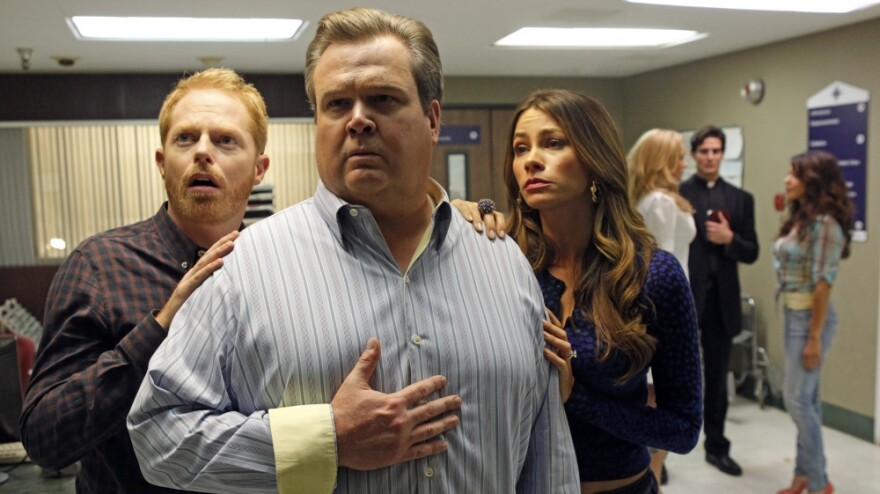In one of the most talked-about moments from the hit TV show Glee, Blaine declared his love for Kurt and then — they kissed.
Glee is just one of many popular shows on television right now that feature gay characters. Those characters aren't just entertaining us, they're changing Americans' attitudes toward homosexuality.
In five separate studies, professor Edward Schiappa and his colleagues at the University of Minnesota have found that the presence of gay characters on television programs decreases prejudices among viewers.
"These attitude changes are not huge," he says. "They don't change bigots into saints. But they can snowball."
Schiappa tells weekends on All Things Considered host Guy Raz that indeed, as Vice President Joe Biden said last Sunday, the hit TV show Will and Grace really did help America get to know gay people.
"With the emergence of the extraordinary Will and Grace show, more and more Americans, sort of from the safety of their armchair, could learn a bit about gay people who they might not otherwise have learned from in real life," Schiappa says.
That was a turning point, he says, even though there were gay characters on TV before Will and Grace premiered in 1998.
"I think that was a turning point simply because of two factors: One is it was enormously popular, so the popularity of that show and the fact that there were two major gay male characters who were very different, allowed the show to do what I call important 'category work' " Schiappa says.
"What I mean by that is there were some critics who said, 'Well, Will isn't gay enough, and Jack's too gay.' Well, actually that's great, because you learn that there's diversity within that category that you had in your head before of gay men," he says.
Viewers met straight-laced Will, an attorney, and his friend, the flamboyant Jack — characters who were likable and could even be identified with in some way, no matter if viewers weren't gay or didn't know gay people. Schiappa says his research found two key ingredients can lead to attitude change.
"Are they likeable? Or are they trustworthy? Are they attractive — there's research that says if they're attractive it can influence your attitudes," he says.
"The other part of the mix is are you learning things through their behaviors and observing them that you didn't know about that category beforehand?" he says. "If so, then the more complicated your category of whatever it is — lesbians, gay men — the less likely you are to reduce them down to a stereotype."
Modern Family is now the most popular TV show in the U.S. There's not only a gay couple, but this couple is in the process of adopting a second child. Schiappa says the idea of a gay couple with children is much more mainstream now.
It must be: Modern Family has won awards from Catholic organizations and even Republican presidential candidate Mitt Romney has said he likes the show.
"There's no question that that the show is doing what I just described before as category work," Schiappa says. "It's changing our understanding of what gay men are like, particularly as parents."
More and more gay married couples are showing up on TV these days — like Grey's Anatomy, for example — making something of a trend. NBC plans to roll out more programs with gay married couples next season. Whether these shows continue to build a positive image of gay people depends on how they'll be portrayed, Schiappa says.
"If they continue to be sympathetic, [it] will only contribute to that larger sea change that we see — across society, really — in terms of the attitudes toward gay marriage," he says.
Copyright 2020 NPR. To see more, visit https://www.npr.org. 9(MDAxNDQ2NDAxMDEyNzU2NzM2ODA3ZGI1ZA001))






